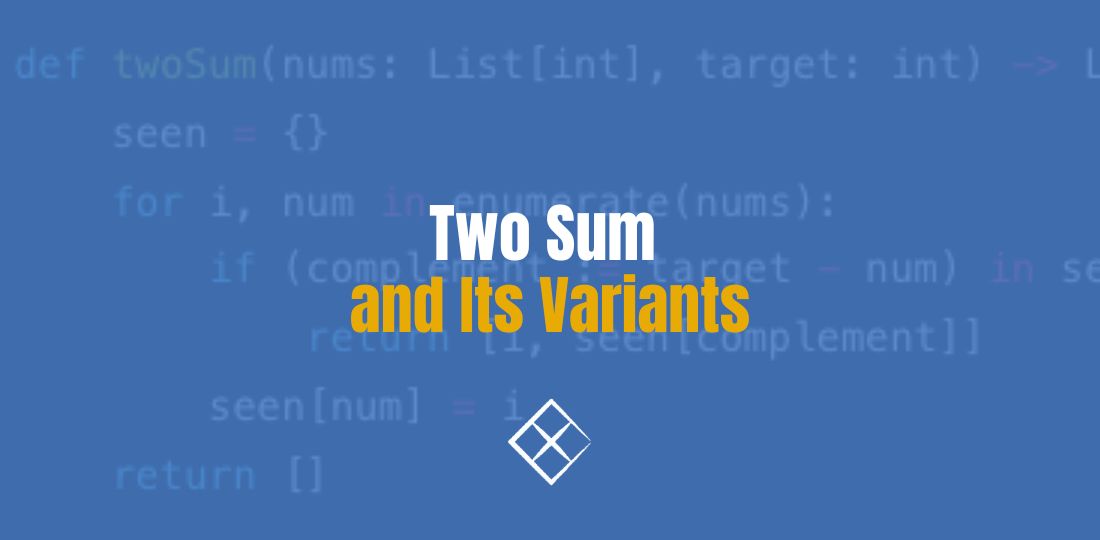Two Sum and Its Variants
Problem Statement
Given an array of integers nums and an integer target, return indices of the two numbers such that they add up to target.
You may assume that each input would have exactly one solution, and you may not use the same element twice.
You can return the answer in any order.
Example 1:
Input: nums = [2,7,11,15], target = 9
Output: [0,1]
Explanation: Because nums[0] + nums[1] == 9, we return [0, 1].
Example 2:
Input: nums = [3,2,4], target = 6
Output: [1,2]
Example 3:
Input: nums = [3,3], target = 6
Output: [0,1]
Brute Force Solution
A straightforward approach is to try all pairs of indices (i, j) and check if nums[i] + nums[j] == target. This approacha has quadratic running time and uses constant extra space (not counting the space used by output).
Hash Map Solution
An optimized approach is to store the numbers in a Hash Table which enables constant lookup time:
python3 def twoSum(nums: List[int], target: int) -> List[int]: seen = {} for i, num in enumerate(nums): if (complement := target - num) in seen: return [i, seen[complement]] seen[num] = i return []
The time and space complexity is both O(n). Obviously the linear running time is optimal as a linear scan of nums is inevitable.
Variant I: Data Structure Design
python3 from collections import Counter
class TwoSum: def init(self): self.counts = Counter()
def add(self, number: int) -> None:
self.counts[number] += 1
def find(self, value: int) -> bool:
return any(
(complement := value - num) in self.counts and
(complement != num or count > 1)
for num, count in self.counts.items()
)
Variant II: Input is sorted.
When nums is sorted we can use two-pointers technique:
python3 def twoSum(numbers: List[int], target: int) -> List[int]: left, right = 0, len(numbers) - 1 while left < right: if numbers[left] + numbers[right] < target: left += 1 elif numbers[left] + numbers[right] > target: right -= 1 else: return [left + 1, right + 1]
Time complexity: O(n)
Space complexity: O(1)
Variant III: Less Than K
python3 def twoSumLessThanK(nums: List[int], k: int) -> int: nums.sort() i, j = 0, len(nums) - 1 ans = -1 while i < j: if (two_sum := nums[i] + nums[j]) >= k: j -= 1 else: ans = max(ans, two_sum) i += 1 return ans
Time complexity: O(nlogn)
Space complexity: O(n) – Python uses timsort which has worst case linear space complexity.
Variant IV: Three Sum
python3 def threeSum(nums: List[int]) -> List[List[int]]: nums.sort() result = [] for i, a in enumerate(nums): if a > 0: break if i > 0 and a == nums[i-1]: continue for b, c in two_sum(nums, i+1, -a): result.append([a, b, c]) return result
def two_sum(nums, start_index, target): i, j = start_index, len(nums) - 1 while i < j: x, y = nums[i], nums[j] if i > start_index and nums[i-1] == x: i += 1 continue if x + y == target: yield x, y i += 1 j -= 1 elif x + y < target: i += 1 else: j -= 1
Time Complexity: O(n^2)
Space Complexity: O(n)
Related Posts
- Leetcode 424 - Longest Repeating Character Replacement
- Single Number
- Leetcode 1004 - Max Consecutive Ones III
- Leetcode 222 - Count Complete Tree Nodes
- Leetcode 1027 - Longest Arithmetic Subsequence
- Question 1299 on leetcode
- Leetcode 240 - Search a 2D Matrix II
- Leetcode 1351 - Count Negative Numbers in a Sorted Matrix
- Leetcode 239 - Sliding Window Maximum
- get-all-digits-in-a-number
- Leetcode 209 - Minimum Size Subarray Sum
- Find all prime numbers up to a given number
- LeetCode 230 - Kth Smallest Element in a BST with Code
- advanced-applications-of-binary-search
- Leetcode 96 - Unique Binary Search Trees
- Leetcode 540 - Single Element in a Sorted Array
- Leetcode 1283 - Find the Smallest Divisor Given a Threshold
- Leetcode 74 - Search a 2D Matrix
- Leetcode 300 - Longest Increasing Subsequence
- Leetcode 930 - Binary Subarrays With Sum
- Blazingly fast solution to LeetCode #1342 - Number of Sub-arrays of Size K and Average Greater than or Equal to Threshold (Cross-post from r/SoftwareEngineering)
- Leetcode 704 - Binary Search
- Leetcode 643 - Maximum Average Subarray I
- LeetCode - Two Sum Solution with Code
- a-binary-search-template
- Prime Factorization of a Number
- Leetcode 1358 - Number of Substrings Containing All Three Characters
- Leetcode 33 - Search in Rotated Sorted Array
- Leetcode 1151 - Minimum Swaps to Group All 1’s Together
